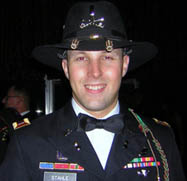
I was a Captain in the Army serving as an OD Officer for five years in the 82nd Airborne Division at Fort Bragg, North Carolina. I still have a military service obligation for another two years, so I am not completely out until that time elapses. For me, the decision to transition was based on my desire to have a better quality of life.
In order to successfully transition, I found it very important to ensure that my civilian career would be challenging and present me with a lot of potential for promotion and growth, as well as incentives for performance. It can be frustrating in the military, which is the complete opposite of "pay for performance" that the civilian market frequently utilizes.
I had 40 days of terminal leave, so I left the military and immediately began my civilian career. I did not utilize the transitioning center, but I did use Orion. When researching potential employers, I found that a majority of the research was done for me by Orion, but for the companies I was very interested in, I would make sure that I took the time to visit their website and learn about the history and products of the company.
Orion placed me with Ametek Materials Analysis Division, as a Supply Chain Manager, in June 2009. I now work in a technological industry. The products my company makes are used to identify elemental concentrations and compounds in substances and are purchased by laboratories, forensic departments, and universities all around the world.
My final move out of the military was a smooth one. The hardest part was out-processing. Once that was done, the move went well, and my adjustment to civilian life began. I ended up settling in the North East. I chose to live here because it is where I was from and also where the main competitive opportunities were in the work force. I would have moved anywhere the job was, though.
Luckily, I knew where my civilian career was going to be located, so I was able to find a nice apartment nearby. The military paid for my transportation of personal goods, as well, because my new job was about the same distance as my home of record.
The main benefit of working in the civilian world is an improved quality of life and added security and dependability. In the military, the hours could vary wildly, and deployments could last a year or longer. Now I work a nice 0830-1730 day and choose when/if to do PT on my own. I have 15 vacation days, which are measured differently than in the military. The civilian world does not count weekend days as vacation days, so 15 civilian vacation days in the military could equate to 23 or more in a civilian job. This is very close to the 30 I had while in the military.
While nothing can compare to the military pension, it is very nice to see companies matching 3-9% in your 401k. If you do a good 30 years in the civilian world, your retirement can be comparable, as well. The compensation also is very generous. I make around 20% more in the civilian world before taxes, and around 10% more after taxes. Plus, the added flexibility of actually having sick days if needed and getting to select your own doctor/dentist is very nice.
The major difference between the civilian and military work world is the work environment. I am in my office or in an office environment about 90% of the time. And, when I am not, I am on an assembly floor or traveling between offices.
Another major difference is the task organizational structure. Everything in the civilian world is very flat, which is not at all like the rigid pyramid structure in the military. Co-worker relationships and decision-making are much more team-based and less direct. It takes some getting use to, and things definitely can move much slower in the civilian world. The operational tempo is around half what it is in the military.
I have found that it was very easy to keep pace and be productive in the civilian work place. However, adjusting and working with cross-functional teams and learning how to "ask for help" was difficult. Instead of depending on rank to get you the respect/responsiveness you would otherwise expect/anticipate, you have to earn it.
I did have to unlearn the hierarchal pyramid and direct leadership styles of the military, as I mentioned above. You cannot just tell someone to do something and expect it to get done in the civilian world. There is no UCMJ, and people have to want to help you and are not just going to "follow orders" because you said so. You have to spend a lot more time explaining your actions and your intentions so that others understand the "why" behind an action.
I have not been with Ametek for long, but my position has a lot of visibility all the way up to the CEO of the company, and my opportunities for advancement are very good. The communication and problem solving skills I learned in the military will help with that advancement. It takes a well-spoken person, as well as a good listener, to be successful in the civilian world. You have to be a critical thinker who can do the due diligence necessary to solve problems and even more importantly, propose solutions. In the military we are taught to never bring up problems without also proposing a solution, and this holds very true in the civilian world.
The military has its perks, but if you're sure that you want to transition make sure you do a good comparison between civilian career options. The decision you make can set the tone for the rest of your civilian career, just like starting in a certain MOS in the military does.














